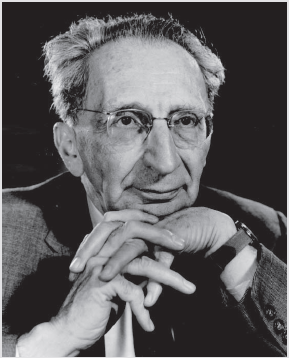<Back to Index>
- Philosopher Herbert Feigl, 1902
- Physicist and Philosopher Philipp Frank, 1884
PAGE SPONSOR

Herbert Feigl (December 14, 1902 – June 1, 1988) was an Austrian philosopher and a member of the Vienna Circle.
The son of a weaver, Feigl was born in Reichenberg (Liberec), Bohemia, and matriculated at the University of Vienna in 1922. He studied physics and philosophy under Moritz Schlick, the founder of the Vienna Circle, and received his doctorate in 1927 for the essay "Chance and Law: An Epistemological Analysis of the Roles of Probability and Induction in the Natural Sciences." He published his first book, Theory and Experience in Physics, in 1929. During this time, became an active member in the Vienna Circle. He was one of the few Circle members (along with Schlick and Friedrich Waismann) to have extensive conversations with Ludwig Wittgenstein and Karl Popper.
In 1930, on an International Rockefeller Scholarship at Harvard University, Feigl met the physicist Percy Williams Bridgman, the philosopher Willard Van Orman Quine, and the psychologist Stanley Smith Stevens, all of whom he saw as kindred spirits. In a 1931 paper with Albert Blumberg, "Logical Positivism: A New European Movement," he argued for logical positivism to be renamed "logical empiricism" based upon certain realist differences between contemporary philosophy of science and the older positivist movement.
In 1931, Feigl married Maria Kaspar and emigrated with her to the United States, settling in Iowa to take up a position in the philosophy department at the University of Iowa. Their son, Eric Otto, was born in 1933. In 1940, Herbert Feigl accepted a position as professor of philosophy at the University of Minnesota, where he remained for 31 years. His close professional and personal relationship with Wilfrid Sellars produced many different collaborative projects, including the textbook Readings in Philosophical Analysis and the journal Philosophical Studies, which he and Sellars founded in 1949. In 1953, with a grant from the Hill Foundation, he established the Minnesota Center for Philosophy of Science. He was appointed Regents Professor of the University of Minnesota in 1967.
He believed that empiricism is the only adequate philosophy for experimental science. Though he became a philosopher instead of a chemist, he never lost the perspective, and the scientific commonsense, of a practical scientist. He was, in the paradigmatic sense, a philosopher of science. Feigl retired in 1971 and died of cancer on June 1, 1988 in Minneapolis.

Philipp Frank (March 20, 1884, Vienna, Austria - July 21, 1966, Cambridge, Massachusetts, USA) was a physicist, mathematician and also an influential philosopher during the first half of the 20th century. He was a logical positivist, and a member of the Vienna Circle.
He studied physics at the University of Vienna and graduated in 1907 with a thesis in theoretical physics under the supervision of Ludwig Boltzmann. Albert Einstein recommended him as his successor for a professorship at the German Charles-Ferdinand University of Prague, a position which he held from 1912 until 1938. He then emigrated to the United States, where he became a lecturer of physics and mathematics at Harvard University.
Astronomer Halton Arp described Frank's Philosophy of Science class at Harvard as being his favorite elective.
He was a colleague and admirer of both Mach and Einstein. In lectures given during World War II at Harvard, Frank attributed to Mach himself the following graphic expression of "Mach's Principle":
"When the subway jerks, it's the fixed stars that throw you down."
In commenting on this formulation of the principle, Frank pointed out that Mach chose the subway for his example because it shows that inertial effects are not shielded (by the mass of the earth): The action of distant masses on the subway rider's mass is direct and instantaneous. It is apparent why Mach's Principle, stated in this fashion, does not fit with Einstein's conception of the retardation of all distant action.
His books include:
- Philosophy of Science (1957)
- Einstein: His Life and Times (1947)
- Foundations of Physics